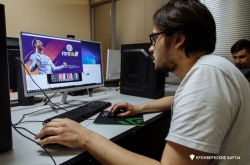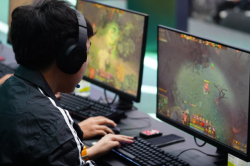Society's anxiety related to such video games as "shooters" and "horrors" is quite understandable. One can't help but wonder: what happens if a gamer will try imitating a game in real life? Won't he snap and become a criminal? From time to time, there are different media reports of people who really did something terrible — and that just adds oil to the flame.
The population of Russia is about 144 million people; according to data from the Newzoo Company that does marketing research for the gaming market, 65% of its citizens play videogames. USA's population is about 320 million people; videogames are popular among half of them. Yet, there are very few cases of violence caused by gamers. So, can gamers be seen as potential aggressors?
In 2015, scientists from the American Psychological Association stated that though children who are interested in videogames are actually more aggressive, there's no proof that they will be violent in real life. The researchers also underlined that videogames are only one of several factors that can contribute to a child or adult becoming violent. Thus, upbringing plays a more important role here, believes Doctor Harold S. Koplewicz, founding president of the Child Mind Institute (USA).
 Albert Safin. Credit: Social networks
Albert Safin. Credit: Social networks
"Normal people clearly understand the difference between games and reality. Surely, there are many games when you play not as the "good" SWAT against terrorists, but as maniacs and such. Yet, you don't go outside and copy the game in real life. Violent behavior can manifest in those players who already have the aptitude. This means that it is the parents' responsibility to pay more attention to their children, and raise them in such a way that they won't be aggressive. What's more, most people start playing videogames during their childhood and continue into their adult lives, some even become cyber-sportsmen and make games their profession. Anyways, gamers have already got used to such statements as "videogames can ruin your mind" and such", comments Albert Safin, second year at the Department of Intelligent Technologies in Industrial Robotics of ITMO University and captain of KronBars cybersport team.
There is still no sound proof that gamers are more aggressive. From time to time, new research appears with different data on the subject. Scientists use different approaches to their research, and check various, though similar hypotheses that can complement or controvert each other.
For example, in 2011 scientists from the Indiana University School of Medicine stated that violent videogames affect the part of the brain responsible for one's control of emotions and aggressive behavior. The study group included men only; the experiment went for 14 days. One group didn't play games at all; the other played only for one week. In the middle of the study and at the end of it, the participants underwent MRI-scanning while having a cognitive test and a game on associations that was meant to induce particular emotions. MRI images showed that "gamers" had decreased brain activity in what has to do with controlling emotions. After the second week, their results were closer to those of the non-gamer group. Thus, scientists came to the conclusion that even a small period of gaming can considerably affect the brain.

On the other hand, a recent study conducted by Hannover Medical School showed that videogames do not affect empathy, which is believed to be the key to being kind. They used the same MRI-scanning methods in studying two groups of people as in the above-mentioned research. One consisted of gamers who play "shooters" daily for no less than three hours, the other — of those who are not used to playing videogames. All participants were to watch images depicting violence during an MRI-scan. The results didn't show any difference in the brain activity of the two groups. What’s more, the participants showed similar results in a psychological survey.
Another popular subject of research is what gamers feel while playing. Scientists from the University at Buffalo (USA) found that only novice gamers experience guilt for what they do in violent video games. Yet, the more they play, the weaker the guilt is. With time, they become indifferent — not only in what has to do with one particular game, but games in general. Gamers state that they see violent actions in virtual space as taking a piece on a chessboard: no one mourns for some pawn or queen. This may be because gamers and those who don't play see the "battlefield" differently. The latter see it as some irregular bloodbath, while the player has his objectives, and doesn't really pay attention to how he achieves them. This doesn't mean that gamers become indifferent to violence, it is just that they have gotten used to it and perceive it differently, underline the scientists.
Understanding the objectives in a game — and the objective of a game — is a really important issue. There is a lot of research that shows that people perceive games differently, and games affect them differently, as well. For instance, a research by Texas Tech University showed that videogames can mitigate defenselessness from bad test scores and motivate the gamer to succeed. Yet, this works only for those gamers who really aim at beating games — those who mostly enjoy the process are indifferent to success in real life, as well. Point is, playing games affects gamers differently: some will get the energy and motivation to correct their mishaps, others will try to hide from reality.

Videogames, especially 3D games, can even improve one's memory. Scientists from the University of California conducted the following experiment: two groups of students were to play videogames for 30 minutes each day for two weeks. One group played 2D games, the other — 3D games. After that, they were given a test: to arrange images in an order they had to memorize. The second group's results were 12% better. Thus, scientists assume that videogames can become an effective way to treating degenerative disorders in elderly patients.
Also, games have a better effect on academic performance than spending time in social networks, state researchers from the Royal Melbourne Institute of Technology. They've analyzed data for 12 thousand 15-year-olds, including their grades in Math, literature and sciences. They've also considered the time they spend on online-games and Facebook. Research showed that those who play games are better at Math and sciences, while those who prefer spending time in social networks show poor results.
"Videogames, especially shooters, improve one's concentration and attention. They make you notice small details, analyze your opponents' actions and plan yours — and do it very quickly. Also, if you're a captain, you learn to work with a team, manage other people", comments Albert Safin.





